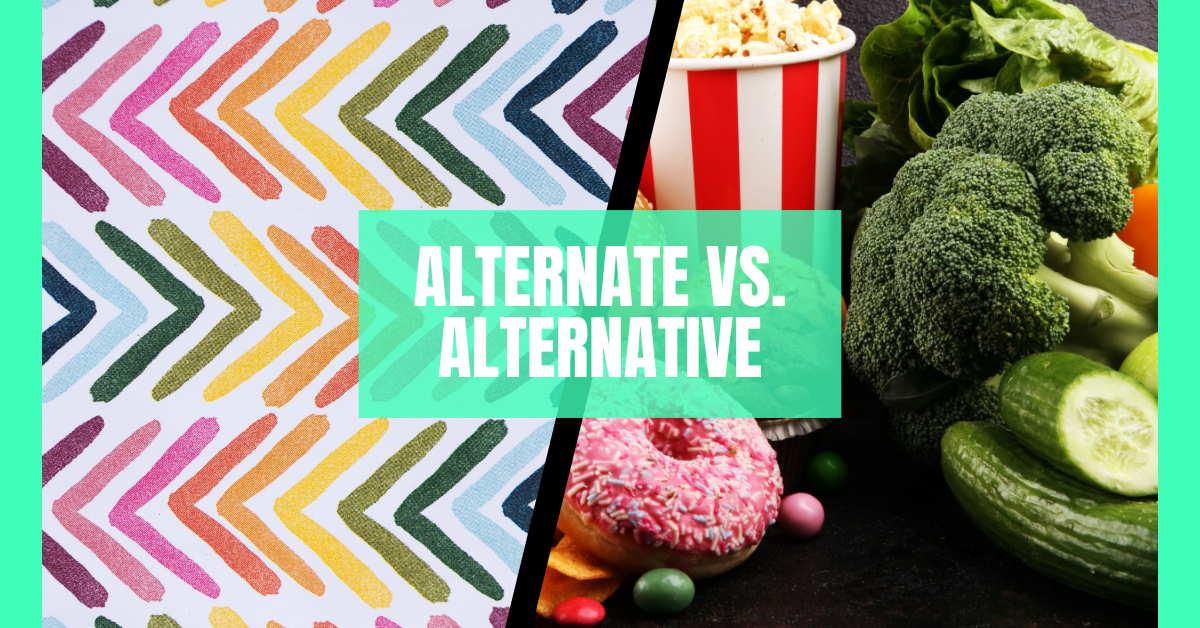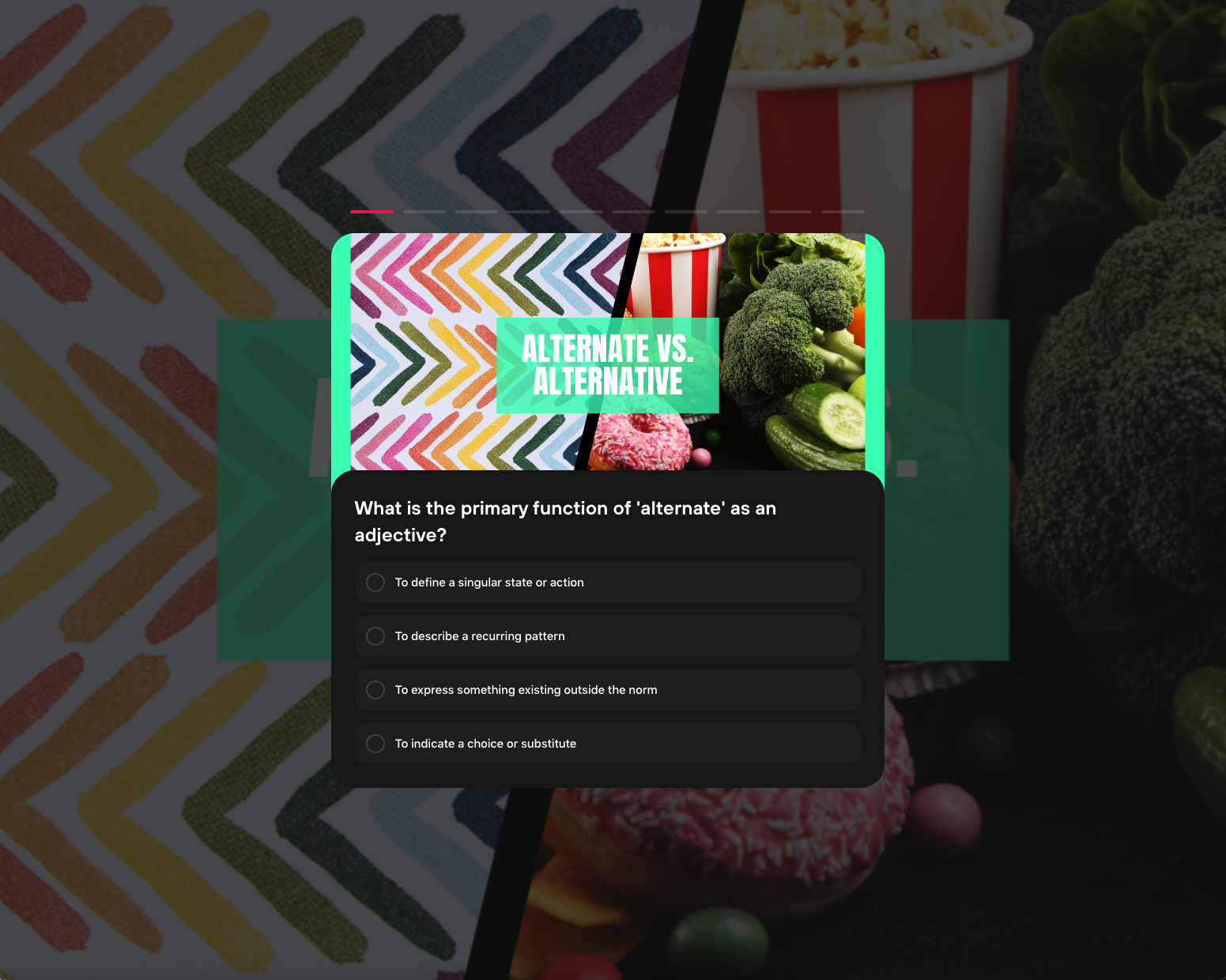Alternate vs. Alternative: Key Differences and When to Use Each

Alternate vs. Alternative: Key Differences and When to Use Each
Alternate vs. Alternative: Understanding the Difference and How to Use Them
In English, words that seem similar can often carry distinct meanings, and “alternate” and “alternative” are no exception. While these terms are frequently used interchangeably, they have specific nuances that set them apart. Understanding these differences can help you use them more precisely, making your communication clearer and more effective.
Source: Learn English Coach YouTube Channel
What Does “Alternate” Mean?
The word “alternate” is both an adjective and a verb, with meanings that revolve around patterns or sequences.
1. As an adjective, “alternate” refers to something that happens in a back-and-forth pattern or at regular intervals. For example:
The team meets on alternate Tuesdays. (Every other Tuesday)
The zebra’s coat features alternate black and white stripes. (Switching between two options)
2. As a verb, “alternate” means to switch between two or more actions or states:
He alternated between jogging and walking to catch his breath.
In essence, “alternate” emphasizes a recurring or rotating sequence.
What Does “Alternative” Mean?
“Alternative” functions as both an adjective and a noun, primarily signifying a choice or option outside of the norm.
1. As an adjective, it refers to something that provides another possibility:
She suggested an alternative solution to the problem. (A different option)
2. As a noun, it describes one of the possible choices:
If we can’t take the highway, the only alternative is the scenic route. (Another option to consider)
“Alternative” is about offering a substitute or another possibility when the usual option isn’t available or desirable.
Key Differences Between “Alternate” and “Alternative”
Although these words can sometimes overlap in casual use, their specific meanings and contexts are distinct.
1. Sequence vs. Choice:
Use “alternate” when describing a back-and-forth sequence or rotation.
Use “alternative” when referring to a different option or substitute.
2. Frequency of Use:
While both words are common, “alternative” is often more prevalent in modern English when discussing choices. For instance:
• Incorrect: We need to find an alternate route.
• Correct: We need to find an alternative route.
3. Flexibility:
“Alternate” is versatile in describing patterns or switching actions, while “alternative” specifically highlights a different possibility or option.
Examples to Clarify Usage
Let’s explore examples that illustrate these differences:
• Alternate:
The teacher alternates between group discussions and individual tasks. (Verb: switching back and forth)
The flag features alternate red and white stripes. (Adjective: occurring in a pattern)
• Alternative:
The school provides alternative meal options for students with dietary restrictions. (Adjective: a substitute)
If the meeting is canceled, what’s the alternative? (Noun: another choice)
Common Mistakes and How to Avoid Them
Confusion is common because “alternate” and “alternative” share roots and occasionally overlap in meaning. Here are some tips to avoid misusing them:
1. Identify the Context:
Is the sentence about a sequence or rotation? Use “alternate.”
Is it about a different choice or substitute? Use “alternative.”
2. Reframe the Sentence:
If you’re unsure which word fits, try rephrasing the sentence with synonyms:
For “alternate,” think of “every other” or “rotate.”
For “alternative,” consider “different” or “another option.”
3. Practice and Familiarize:
Regular exposure to well-written examples can help reinforce correct usage.
Why Precision Matters
Choosing the right word isn’t just about following grammar rules—it’s about conveying your ideas clearly and avoiding misunderstandings. Misusing “alternate” and “alternative” might not derail a conversation, but it can create confusion, especially in formal writing or professional contexts.
Final Thoughts
Understanding the distinction between “alternate” and “alternative” can refine your English and make your communication more precise. Remember, “alternate” focuses on patterns and sequences, while “alternative” emphasizes choices and substitutes. By keeping these definitions and examples in mind, you’ll confidently navigate situations where these words come into play.
So, next time you’re deciding between these two terms, take a moment to consider the context. Is it about switching back and forth or offering a different option? With practice, the choice will become as clear as your writing.
FREE Quiz
Take our free quiz to test your knowledge of Alternate vs. Alternative. 👉 Click Here to Start the Quiz.






